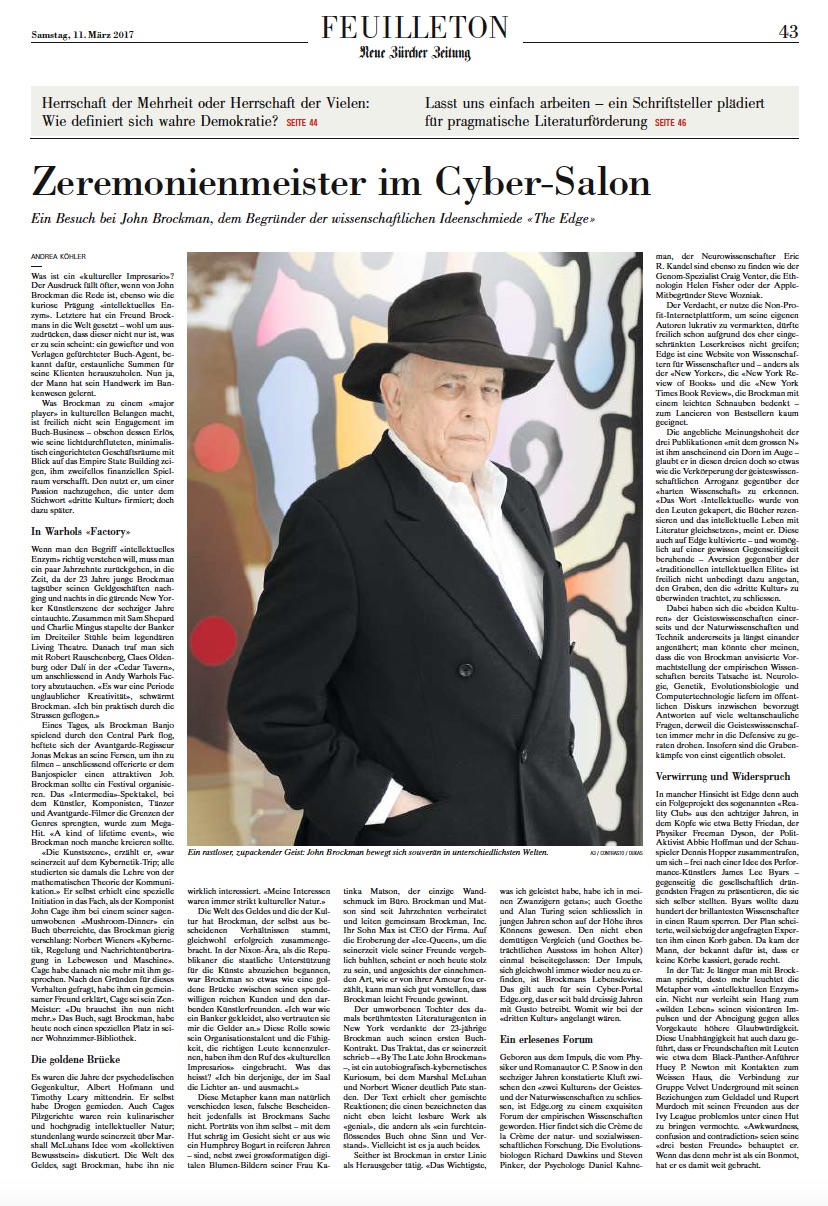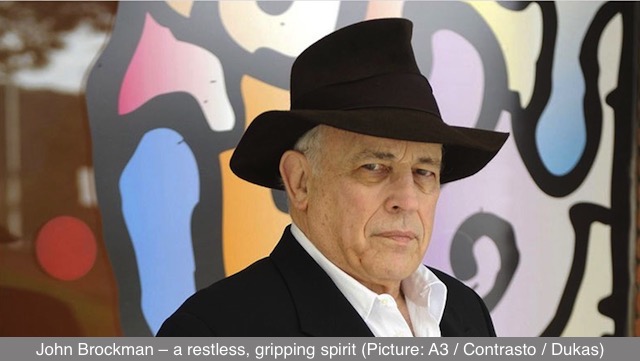The golden bridge
Nevertheless, Brockman, who comes from a modest background himself, successfully brought together the world of money and the culture. In the Nixon era, when the Republicans started to withdraw government funding for the arts, Brockman was something like a golden bridge between donors and his starving artist friends. "I dressed like a banker, so they trusted me with the money." This role as well as his organizational talents and the ability to get in touch with the right people gave him the reputation of "cultural impresario." But what does that mean? "I am the one who stands at the back of the hall and turns the lights on and off."
This metaphor of course can be read ambiguously; false modesty, anyway, is not Brockman’s thing. Portraits of himself—with his hat slanted over his face, he looks like Humphrey Bogart in his mature years—are, along with two large-format digital floral images by his wife Katinka Matson, the only wall decoration in the office. Brockman and Matson have been married for decades and jointly manage Brockman, Inc. Their son Max is CEO of the company. Brockman still seems to be proud of his conquest of the "Ice Queen" who had been courted in vain by many of his friends; and his engaging manner in recounting the story of their Amour fou makes it easy to imagine that Brockman wins friends effortlessly.
"The impulse to reinvent himself over and over
is Brockman's life motto."
Brockman, then 23 years old, also owed his first book contract to his future wife, the daughter of the most famous literary agent in New York at that time. The tract that he wrote at the time—By The Late John Brockman—is an autobiographical-cybernetic curiosity, clearly inspired by Marshal McLuhan and Norbert Wiener. The text, not an easy read, received rather mixed reactions; some praised it as "ingenious," others denounced it, "a frightening book without sense and reason." Maybe it is both.
Since then Brockman has been primarily an editor. "The most important things I’ve accomplished, I did in my twenties”, he says, pointing out that Goethe and Alan Turing too had reached the zenith of their abilities at a young age. This not quite humble comparison (and the fact of Goethe’s considerable output in old age) notwithstanding: the impulse to reinvent himself over and over is Brockman's approach to life. This also applies to his cyber portal Edge.org, which he has been running with gusto for more than thirty years. And this now leads us to the "third culture."
An exquisite forum
Born out of the impulse to close the gap between the "two cultures" of the humanities and the natural sciences—a phenomenon to which the physicist and novelist CP Snow hat pointed already in the sixties, Edge.org has established itself as an exquisite forum for the empirical sciences. Here you can find the crème de la crème of natural and social sciences and research: the evolutionary biologists Richard Dawkins and Steven Pinker, the psychologist Daniel Kahneman, the neuroscientist Eric R. Kandel, as well as the genome expert Craig Venter, the ethnologist Helen Fisher and Apple co-founder Steve Wozniak.
The suspicion that Brockman is using the non-profit Internet platform to market his own authors is disproved by the sheer limitation of its public. Edge.org is a scientists’ page for scientists, and—unlike the New Yorker, the New York Review of Books, and the New York Times Book Review, which Brockman mentions with a slight snort—it is hardly suitable for launching bestsellers.
The eminence of the three "with the big N" seems to be a thorn in his side—he believes these publications embody the arrogance of the humanities toward natural sciences. "The word ‘intellectual’ was hijacked by people who review books and equate intellectual life with literature," he says. This aversion to the "traditional intellectual elite," which is also cultivated on Edge and may well be mutual, certainly does not help to close the gap which the "third culture" sought to overcome.
"The longer you talk to Brockman, the
more the metaphor of the 'intellectual enzyme'
begins to shine."
Actually, there has been quite a rapprochement between the "two cultures" of the humanities on the one hand and the natural sciences and technology on the other; and it is fairly safe to say that the supremacy of empirical sciences postulated by Brockman is already fact. Neurology, genetics, evolutionary biology and computer technology provide the public discourse with answers to many philosophical issues, whereas the humanities are more and more on the defensive.
Confusion and contradiction
In some respects, Edge is a follow-up to the "Reality Club" called into being by the performance artist James Lee Byars in the 1980s, where thinkers like Betty Friedan, the physicist Freeman Dyson, the political activist Abbie Hoffman and the actor Dennis Hopper gathered to ask each other the questions they were asking themselves. Byars’ original idea of his “World Question Center” was to bring together the hundred most brilliant minds in the world in a single room. The plan failed because seventy of the invitees declined. Then along came the man who is known for not accepting a “no.”
In fact, the longer you talk to Brockman, the more the metaphor of the "intellectual enzyme" begins to shine. Not only does his penchant for the "wild life," lend credibility to his visionary impulses, so does his aversion towards everything that smells of the prefabricated. This independence of mind also made it possible for him to reconcile his friendships with Black Panther leader Huey P. Newton to his contacts to the White House; his relationship to Velvet Underground with his connections to people in the moneyed aristocracy; or his acquaintance with Rupert Murdoch with old Ivy League friendships. He claims that "awkwardness, confusion and contradiction" are his "three best friends." If this is more than a bon mot, he has come a long way with them. ■
_____
First published in German by Neue Zürcher Zeitung, Samstag, 11. März 2017.



